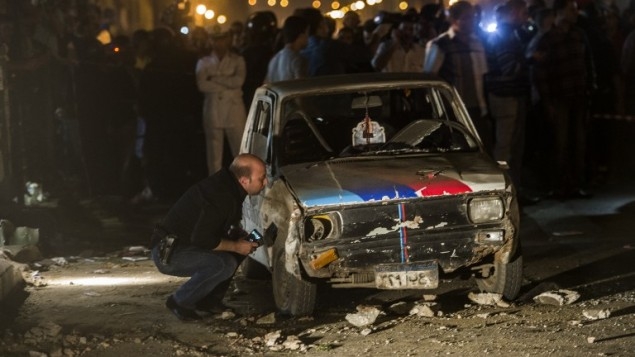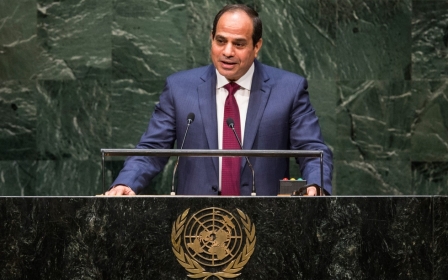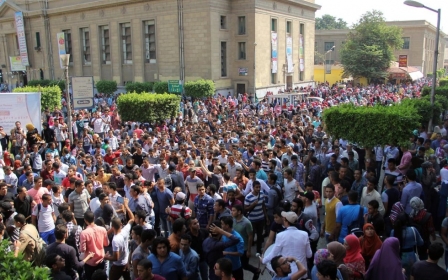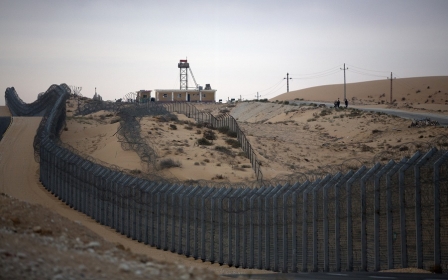Are Egypt terror attacks hampering economic stability?

Tuesday’s bomb blast near Cairo’s High Court of Justice aimed to “hamper the developments that the country is seeing.”
These were the words of the capital’s governor, Jalal al-Saeed, as he visited the injured in hospital in the aftermath of a bloody explosion that left 13 people wounded.
Many outlets have reported that Ajnad Misr, a relatively newly-formed militant group based in the restive Sinai Peninsula, claimed responsibility for the central Cairo attack.
However, in a post on their official Twitter page the group denied claims of their responsibility for the attack which, according to police, targeted officers working near a Metro station.
Last month there had been another large explosion that hit the capital, a bomb blast that rocked an area of downtown Cairo near the Foreign Affairs Ministry and left two police officers and one civilian dead, and the group claimed responsibility for it within hours, unlike on this occasion.
The group's denial of this latest attack could raise concerns among Egypt’s security services – if Ajnad Misr was not responsible, there will be questions as to who was.
This is particularly true since a recent crackdown on a second militant group, Ansar Beit al-Maqdis, which is Egypt’s most active.
The group (ABM), also based in the north-eastern province of Sinai, has been the subject of a concerted campaign by the Egyptian military for over a year.
Last week saw another of their leaders killed, less than a week after the killing by Egyptian security forces of 16 ABM members on 7 October.
The denial by Ajnad Misr, whose name is the Arabic for Soldiers of Egypt, could mean either that ABM has not been as weakened by the recent crackdown as security services might have hoped, or that another militant group is now active in the capital.
‘Developments’ in Egypt
This form of political violence, with militant groups like Ajnad Misr targeting what they call “criminal elements” in the Egyptian administration, is in itself nothing new for the country.
“It is a given that there have been political tensions in Egypt for a long time,” according to David Butter, an associate fellow in the MENA programme at UK-based policy institute Chatham House.
“There is clearly a lot of tension in the system from the 2013 crackdown on Islamists,” Butter told MEE.
In recent months, though, many have expressed fears that such activity is set to come to a head not just because of what Butter called the intermittent “doses of repression” that surface as President Sisi’s government continue to establish itself, but also as a result of continuing poverty and economic despair.
President Abdel Fattah al-Sisi, the former army general behind Morsi’s toppling who celebrated a landslide election win in May, made delivering both security and economic stability two key tenets of his successful presidential campaign.
However, a poll carried out by the Ibn Khaldun Centre for Development Studies as Sisi marked his first 100 days in power in late September found that, while the majority of respondents were satisfied with the President’s rule in general, over 65 percent were either unhappy with or indifferent towards his often controversial economic policies.
The announcement of a mega-project to build a new Suez Canal parallel to the old one garnered praise and prompted a flurry of stock buying in September, with the central bank governor reporting that the government had found the $8.5bn needed to fund the project within just eight days after opening up investment opportunities to ordinary Egyptians.
Although such headline-grabbing measures are undoubtedly a boost to the economy, the daily reality of poverty still drags on for millions of Egyptians and, according to Butter, the achievements so far have yet to trickle down to ordinary people.
“Unemployment has stabilised, and the economy is starting to show some growth – the government has been able to mobilise quite significant support from the Gulf.”
But inflation remains high, exacerbated by the unpopular decision to cut government subsidies in July, and there are “still no real perceptible widespread improvements” in the lives of ordinary people.
Despite efforts to bring about improvements to Egypt’s ailing economy, there remains a perception that a key stumbling-block to economic growth has yet to be tackled – rampant corruption.
A video being circulated on social media which appears to show a police officer receiving a bribe has been watched tens of thousands of times since it was posted two weeks ago, and was covered by a plethora of Egyptian news sites.
One commentator wrote that such scenes remain “completely normal – they happen throughout the country.”
In a further sign that economic reforms could yet face fierce challenges, Egypt’s Agriculture Minister, Adel al-Baltagi, admitted in August that the price of importing wheat is likely to rise again in 2015.
This would have a disastrous impact on Egypt, the world’s largest buyer of the staple, whose imports have been growing steadily for decades.
Even if Sisi’s government manages to stamp out corruption and ride out the coming wheat price hikes, says Butter, there is no guarantee that things will get better for everyone.
“If all the economic indicators look better, it by no means guarantees content across society or the necessary equitable distribution of those benefits.”
There is widespread concern that continued deprivation and inequality will fuel tension and ultimately political violence.
This would in turn thwart the economic growth that many are so desperate for, as has happened in the years since 2011 as increased violence has squeezed key income sources, chief among them tourism.
The governor of Cairo’s comments in the aftermath of Tuesday’s high court bombing point to fears that any improvements achieved so far could be imperiled by further violent incidents.
Butter, though, is cautious about the likelihood of this truly vicious cycle of poverty and violence worsening in the coming years.
“It’s possible to achieve improvements in many aspects of the economy with the political situation as it is.
“Even with some violent opposition and some quite widespread political discontent, the majority of people are still politically inactive.”
“If the economy is moving in a positive direction, Sisi’s administration can probably rely on the majority of Egyptians to be ready to accept the political situation as it is.
However, “whether such a situation is sustainable is another issue. Repression, discontent, simmering violence; these are clearly not healthy long-term phenomena.”
Middle East Eye propose une couverture et une analyse indépendantes et incomparables du Moyen-Orient, de l’Afrique du Nord et d’autres régions du monde. Pour en savoir plus sur la reprise de ce contenu et les frais qui s’appliquent, veuillez remplir ce formulaire [en anglais]. Pour en savoir plus sur MEE, cliquez ici [en anglais].




